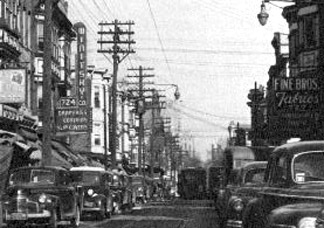| Fourth Street in the forties |
 |
| photo courtesy of The Atwater Kent Museum |
| Fourth Street in the forties |
 |
| photo courtesy of The Atwater Kent Museum |
| For many merchants, World War
II proved to be more challenging than the Depression. Because fabric
manufacturers were supplying the armed forces, it was difficult to keep
the stores stocked.
"I used to commute to New York
every day [to find fabrics]."
"We used to close a lot because
we didn't have the merchandise, and we weren't going to pay black market
prices."
"You had lines of people waiting
for fabric."
Moreover, the stores had to close Tuesdays and Thursdays at 6 p.m. to conserve electricity. According to Gertrude Zubrow Gubernick, her father, Nathan Zubrow, had a fire alarm bell hooked up to a light switch in his store. At 6 p.m. he rang the bell as the signal for the shops to close. Sometimes a storekeeper asked him to hold off ringing the bell -- if he was in the middle of a sale -- or to ring it early, so a non-buying customer wouldn't go to a competitor! The war was hard on the Jewish merchants for other reasons, too. They worried about their sons in the army, and about the fate of relatives still in Europe. "The Holocaust was an emotional
drain on my parents. They both had left large families behind."
|
| click arrow to previous page | click arrow to continue |